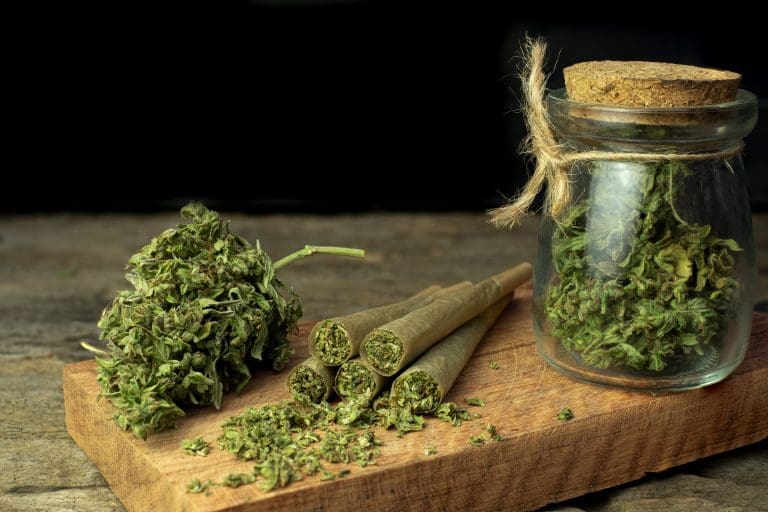Orange was never the new Black. In fact, in Florida, it was green.
And in what is considered to be a cannabis gold rush (hence, the green), most dispensaries are chasing the same thing: fast money and faster expansion.
But while one Black woman — Jasmine Johnson — might want the same things for her brand (which she calls the “Whole Foods” of weed), she is building something different with GŪD Essence. At the heart of her mission is making sure communities most harmed by prohibition actually see the benefits now that cannabis has gone mainstream (but don’t get it twisted, money and expansion are still part of the motive too).
In fact, Johnson is one of the few Black women running a cannabis operation at this scale in a state that now serves over 900,000 registered patients, and to be successful, particularly as a Black woman, she didn’t get into this business playing it safe.
She frames GŪD Essence as more than a dispensary, positioning it as a cultural hub that blends education, trust, and community care. “We’re here to educate, guide, and build trust,” she says. “When people walk into our space, they should feel like they’re stepping into a place that values quality, transparency, and connection.”
Her path to cannabis leadership wasn’t traditional, but all necessary building blocks that have gotten her to where she is right now. Johnson comes from agriculture, hospitality, and real estate. Her family background taught her respect for the land and the value of cultivation, while her Tourism & Hospitality Management degree from FIU shaped how she thinks about creating experiences. Even in college, she was building—opening Crescendo Jazz and Blues Lounge, which as she says, “went from dream to reality.”
Education was an anchor for her too. At Booker T. Washington High School in Historic Overtown, she got exposure to science and medicine that shifted her perspective. She interned in vascular pathology research at the University of Miami and worked in pharmacy, experiences that made her see cannabis through the lens of both wellness and business.
And if the resume wasn’t already stacked, real estate added another layer. Her mother was among the first Black Century 21 brokers in Florida, and Johnson grew their family holdings into a multi-million-dollar portfolio. That work gave her the ownership mindset she now brings into cannabis — a mindset she says is critical in an industry where so much equity is at risk.
But for Johnson, all of these experiences connect to restoration. “Cannabis has always been part of our story — from the herbs our grandmothers used to the ways our communities found relief despite systemic challenges,” she says. “Today, it’s about reclaiming those traditions openly and with dignity.”
Ultimately, she’s working toward building a seed-to-sale research facility in Overtown, a neighborhood deeply impacted by prohibition. Her vision is to create jobs, train people from the community, and prove cannabis can be a platform for healing, learning, and opportunity. All things deeply necessary for “us” to get a piece of the green rush pie.
She’s also tired of conversations that reduce cannabis to people “just wanting to get high.” For her, cannabis is a tool to address stress, trauma, insomnia, and even to unlock creativity and joy. GŪD Essence leans into intention, showing that cannabis can be wellness, not just stigma.
This shapes how GŪD Essence operates. Instead of rapid expansion, Johnson focuses on sustainable growth. “We measure success differently. It’s not just about how many dispensaries we open in year one, but about how many lives we touch, how many people we train, and how many doors we open for equity in this industry.”
In this day and age (and obviously with this administration), capital is still hard to access for Black women entrepreneurs, so Johnson leaned on creative financing. Her parents, both real estate investors, became her first backers, putting up collateral from the family portfolio. “My name may be free on paper, but this is a very real debt I carry,” she says. “If anything, it pushes me harder to succeed because my family’s sacrifices are tied to this business.”
She’s structured GŪD Essence as employee-owned, a way to make sure equity isn’t just about who sits in the C-suite but also who shares in the growth. This is something that can only be respected as a leader who is ensuring the people around her win too.
With visibility comes pressure though. “When people see me in this role, they’re not just seeing Jasmine,” she says. “They’re seeing proof that Black women can lead in cannabis, build multimillion-dollar businesses, and shift culture.” That responsibility, she adds, means staying alert to predatory deals that promise diversity while stripping ownership away.
Policy reform is also front of mind. She calls for rewriting laws that still punish people with past cannabis convictions. “No one should be barred from opportunity twice for the same plant,” she insists. She’s equally vocal about unifying the language: cannabis is cannabis, not hemp here and marijuana there. For her, clarity creates room for research, science, and smarter policy.
“I stand on the shoulders of strong people who survived and thrived so that I could be here,” she says. “GŪD Essence is not just a business — it’s a responsibility to honor those legacies.”





